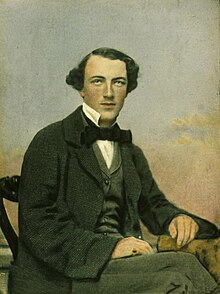
Back توم ويلز Arabic توم ويلز ARZ Tom Wills French トム・ウィルス Japanese Tom Wills Portuguese Tom Wills SIMPLE Tom Wills Swedish டாம் வில்சு Tamil ٹام ولز Urdu
Tom Wills | |
|---|---|
 Wills, c. 1857 | |
| Born | Thomas Wentworth Wills 19 August 1835 |
| Died | 2 May 1880 (aged 44) |
| Cause of death | Suicide by stabbing |
| Resting place | Warringal Cemetery, Victoria, Australia |
| Partner | Sarah Barbor |
| Parent(s) | Horatio Wills Elizabeth McGuire |
| Relatives | Thomas Antill (cousin) H. C. A. Harrison (cousin) |
Thomas Wentworth Wills (19 August 1835 – 2 May 1880) was an Australian sportsman who is credited with being Australia's first cricketer of significance and a founder of Australian rules football. Born in the British penal colony of New South Wales to a wealthy family descended from convicts, Wills grew up in the bush on stations owned by his father, the squatter and politician Horatio Wills, in what is now the state of Victoria. As a child, he befriended local Aboriginal people, learning their language and customs. Aged 14, Wills went to England to attend Rugby School, where he became captain of its cricket team and played an early version of rugby football. After Rugby, Wills represented Cambridge University in the annual cricket match against Oxford, and played at first-class level for Kent and the Marylebone Cricket Club. An athletic bowling all-rounder with tactical nous, he was regarded as one of the finest young cricketers in England.
Returning to Victoria in 1856, Wills achieved Australia-wide stardom captaining the Victoria cricket team to repeated victories in intercolonial matches. He played for the Melbourne Cricket Club but often clashed with its administrators, his larrikin streak and defections to rival clubs straining their relationship. In 1858, seeking a winter pastime for cricketers, he called for the formation of a "foot-ball club" with a "code of laws". He captained a Melbourne side that winter, and in 1859 co-wrote its laws—the basis of Australian rules. Over their careers, he and his cousin H. C. A. Harrison further developed the game as players, umpires and administrators. In 1861, at the height of his fame, Wills went to outback Queensland to help run a new family station. Soon after his arrival, his father and 18 station personnel died there in Australia's largest massacre of colonists by Aboriginal people. Wills survived and returned to Victoria in 1864, and in 1866–67, he led an Aboriginal cricket team on an Australian tour as its captain-coach.
In a career marked by controversy, Wills subverted cricket's amateur-professional divide, and was accused of popularising intimidatory tactics, such as the head-high bouncer. He also earned a reputation for bending sporting rules to the point of cheating, in particular throwing. This he boasted about, and in 1872 he became the first cricketer to be called in a top-class Australian match. Dropped from the Victorian team, Wills failed in an 1876 comeback attempt, by which time he was considered a relic of a bygone era.[1] During this period, he supported Australia's first organised women's cricket team—the only prominent male cricketer to do so. His final years were characterised by social alienation, flights from creditors, and heavy drinking, likely as a means of numbing post-traumatic stress disorder (PTSD) symptoms that resaulted from the massacre. In 1880, suffering from delirium tremens, Wills fatally stabbed himself in the heart.
Australia's first sporting celebrity, Wills fell into obscurity after his death, but has undergone a revival in Australian culture since the 1980s. Today he is described as an archetypal tragic sports hero and as a symbol of reconciliation between Indigenous and non-Indigenous Australians. He has also become the central figure in "football's history wars"—an ongoing dispute over whether Marn Grook, an Aboriginal ball game, influenced early Australian rules. According to biographer Greg de Moore, Wills "stands alone in all his absurdity, his cracked egalitarian heroism and his fatal self-destructiveness—the finest cricketer and footballer of the age".[2]
- ^ de Moore 2005a, p. 371.
- ^ de Moore 2011, p. 326.
© MMXXIII Rich X Search. We shall prevail. All rights reserved. Rich X Search